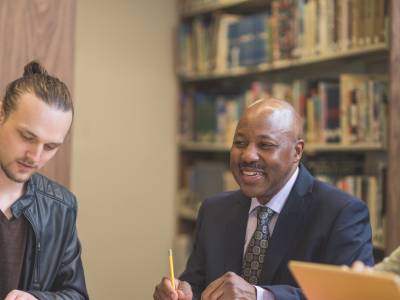Guide to LLM Study in the United States
By ILI in LLM in the United States on Jun 09, 2010
The study of law in the United States is unlike that in most other countries. First of all, the basic law degree, the Juris Doctor ("JD"), is considered a graduate level professional degree and students enter the program already possessing a college diploma. With the exception of a mandatory introduction course covering the basics of U.S. law, LL.M. students generally take classes alongside their J.D. counterparts. Depending on the policies of the school, special LL.M. seminars may also be offered, but may be open to J.D. students as well.
Secondly, American legal education is far more participatory than the traditional lecture method used in civil law education. Rather than relying on scholarly treatises, American law schools use the "case method" -- studying casebooks containing actual court decisions to derive legal rules. Moreover, professors have traditionally used the "Socratic" method of teaching in which the professor asks a series of questions thereby guiding the student toward the correct responses. All students are expected to read the assignments and take part in discussions. Many professors consider class participation to be an integral component of the final class grade.
A word about assigned readings. The necessity of reading English quickly and with good comprehension cannot be over-stressed in order to succeed in graduate study in the United States. Typical reading assignments may range between fifteen and sixty pages per class. I have had international friends tell me that the most difficult part of their LL.M. experience was trying to complete all the reading assignments.
American law school classes are taught either as lecture courses, or smaller seminar courses. Lecture courses may range in size from approximately fifteen people for a specialized course such as Admiralty or Conflict of Laws to perhaps sixty or more for a class such as Secured Transactions or Corporations. Lecture courses, particularly those which have a large number of J.D. students, generally are taught using the Socratic method and have a single examination at the end of the course which determines the grade. The larger the course, the more likely it is that it will be taught by a full-time faculty member, rather than by a practicing lawyer who teaches as an adjunct professor.
Seminar courses, on the other hand, have fewer students, and treat a specialized topic in greater depth, consequently the reading assignments may be somewhat longer and students are expected to participate more often. Seminars are graded either on the basis of final exams or through the preparation and presentation of original research papers, as well as classroom participation. Some professors will also agree to sponsor directed research projects.
Research and writing is an essential component of graduate legal education in the United States. In addition to shorter papers which are written for seminars, most law schools require some sort of graduate thesis of substantial length. This is the single most time-consuming part of the LL.M. and it is wise to have a topic in mind and work consistently on the paper throughout the semester or semesters in which it is assigned. Students prepare their graduate thesis for a supervising professor who is available to offer advice. Because the graduate thesis is so central to the LL.M. program, students with a particular research interest would do well to determine if the school has the resources available to facilitate their research. There is perhaps nothing more frustrating than conducting research and discovering the library has either very little material on the subject, or what it has is far out of date. Thankfully, the Internet has simplified international legal research to a significant degree, however, a well-stocked law library with knowledgeable staff makes your job easier. Many LL.M. students revise their thesis and submit them for publication to American law journals.
Final examinations are a necessary evil. In law schools, examinations are generally presented as essay questions, rather than multiple choice tests. A typical law school exam consists of three one-hour questions, each of which sets out a fact pattern and asks specific questions that are to be addressed in an essay. These exams are comprehensive and generally test all the areas covered in the lectures. Some professors permit the students to bring written materials into the examination room and others require the exams to be "closed book", that is, taken without the benefit of any reference materials. The professors will make their policies clear, and failure to abide by the examination rules is considered a violation of the school's honor code -- a very serious infraction. Examinations are timed, and while some schools permit additional time for international students whose native language is not English, others do not. Again, the ability to read and write legal English is key to success in American law schools. For representative examples of American law school examinations, take a look at the International Business Transactions exams posted by Professor Peter Winship of the S.M.U. Law School.
Comments
basanta kumar thapa, Aug 06, 2010 11:14
Please suggest me .Is it possible for using research methodology in assignment in LLM study ?
LLM News
LLM Articles
Why Tech Law is the Hot New LL.M. Focus in an AI Era
Nov 14, 2024
Schools are helping lawyers prepare for a fast-changing legal world impacted by AI and developing technology. Students can benefit from a cutting-edge curriculum and new job opportunities.
Connect with Top California Law Schools
Nov 07, 2024
The California Law LL.M. Consortium is giving prospective students in Milan and London the opportunity to meet school and admissions representatives. They will hear about top legal issues and learn about how a U.S. LL.M. can benefit their careers.
Leaping Back into Firm Life After an LL.M.
Nov 05, 2024
Leaving school behind can feel daunting but if a graduate understands the different expectations and is conscious of new technology, it can make returning to a firm that much easier.
Making the Most of Your LL.M.: Why Extracurricular Groups Matter
Oct 28, 2024
Activities outside class time can give students a more well-rounded experience during their degree. They can build crucial skills and expand a student's network to benefit their post-school life.













